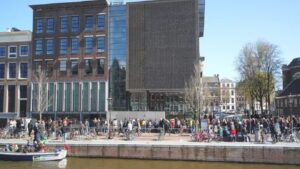
Young Dutch People Questioning the Holocaust
Anti-Semitic football fans, harassment, and attacks: in the Netherlands, anti-Semitism is on the rise. Holocaust relativization is again becoming acceptable, particularly among younger people. What are the reasons for this, and what can be done about it?
Anne Frank’s House as a Memorial Site
Almost everyone in the Netherlands knows Prinsengracht 263 in Amsterdam. It is the house where Anne Frank and her family, hid from the Nazi persecution of Jews between 1942 and 1944 and where she wrote her famous diary. Today, the house is a memorial site, and thousands of visitors from all over the world come to see it every day.
One-third of all Dutch people have already visited the house, often as part of their school curricula. This experience leaves an impact on them. “I was there with a survivor of the war,” says one young woman. “The personal dimension touched me.” Another adds, “Here you can learn what happened back then, and it must never happen again.”
The Doubt in the Official History

However, there are also other opinions. A young man passing by the museum admits he has never been there, and he is not really interested. He says that he has already learned everything about the topic in school. Actually, he thinks too much is spoken about the Holocaust.
The Jewish Claims Conference study earlier this year revealed that the knowledge of Holocaust history is not very good among younger generations in the Netherlands. For this study, people from different countries were asked about their attitudes towards history. Twelve percent of Dutch people doubted the official historical account, and among those under forty, almost a quarter of them downplayed the significance of the Holocaust. These are the highest figures ever recorded in the Netherlands.
The Disappearance of a Value Canon
Critics questioned the methodology of the survey, but the figures were not challenged. They confirmed the findings of the Dutch government. This is of concern to the self-image of the country. The Netherlands long considered itself particularly exemplary in dealing with the past. There is no shortage of commemoration days, and the Holocaust is a mandatory topic in schools. Nevertheless, it appears to have an impact on only a few young people.
The national anti-Semitism commissioner of the Netherlands, Eddo Verdoner, believes that social media has a role to play in this. He says that people are increasingly moving into bubbles and are presented with alternative realities. In addition, society is becoming increasingly polarised, and the time of National Socialism is moving further into the past. “All of this leads to the fading of our social value canon,” says Verdoner. This causes people to become more susceptible to conspiracy theories.
This is not only happening in the Netherlands but across Europe. The study by the Jewish Claims Conference shows that it is mainly younger generations who are increasingly doubting the Holocaust.
The consequence is that anti-Semitic thought patterns are spreading again. This is observed by the European Union Agency for Fundamental Rights. They regularly survey 16,000 Jewish people across Europe, asking how they perceive their daily lives, and the results are frightening.

“Then modern Europe makes no sense anymore”
In the latest survey by the EU Agency, 90% of respondents stated that increasing anti-Semitism is a concern for them. Over a third of them had experienced discrimination themselves. These trends have been worsening for years, according to the EU Agency. The current edition of the study is being prepared, and unfortunately, the head of the EU Agency, Michael O’Flaherty, does not expect a positive change.
What particularly shakes him is that 38% of the surveyed Jews are considering emigrating, especially to Israel or the USA. This must not happen. If Europe expels its Jewish population, it will be more than a cultural loss. “Then modern Europe becomes pointless,” says the EU official, as the European project is ultimately built on the experiences of the Holocaust.
So what can be done? The EU Agency recommends a new approach to teaching history. As there are hardly any survivors left who can share their experiences, new ways must be found to make history personally tangible. They are also taking this to heart in the Netherlands. Anti-Semitism Commissioner Verdoner recommends a three-step strategy.
Making Jewish Life More Visible
First, Jewish life must become more visible to eradicate the fear surrounding it. This includes better education about Jewish customs. Second, decisive action must be taken against anti-Semitism, such as in football stadiums. Third, new teaching methods are needed. This includes digital formats and direct contact.
Verdoner envisions a database for schools to find and visit memorial sites near them. “So people can see: all this also happened in my city, my village.” This helps to understand, and it is effective against conspiracy theories.
They are experimenting with new teaching methods at the Anne Frank House, such as publishing Anne Frank’s diary on Instagram. However, the most important thing remains a personal visit to the site, according to the museum team. When school classes climb the stairs to the back of the house and enter the hideout where eight Jewish fates played out, their conception of history becomes clear.